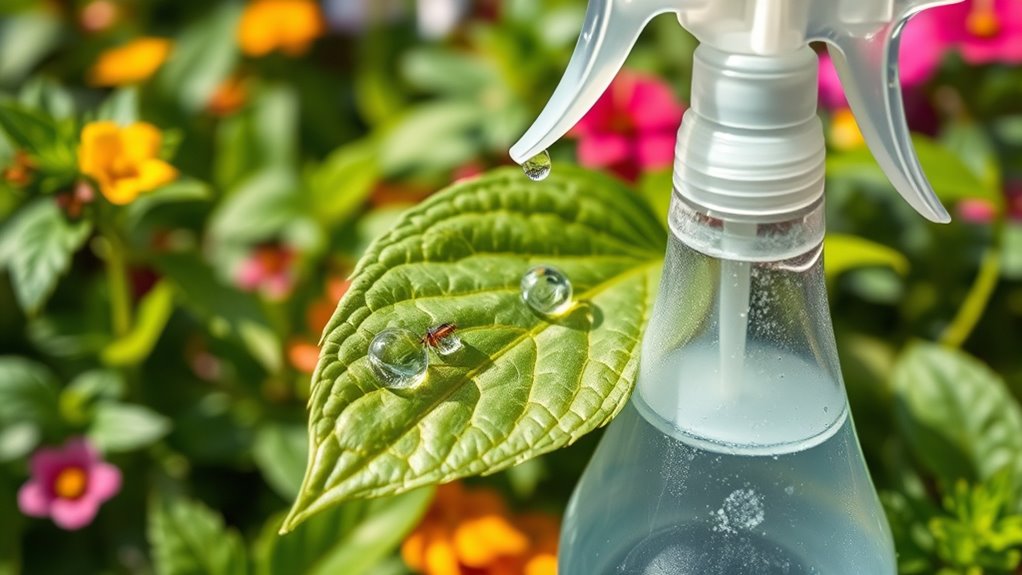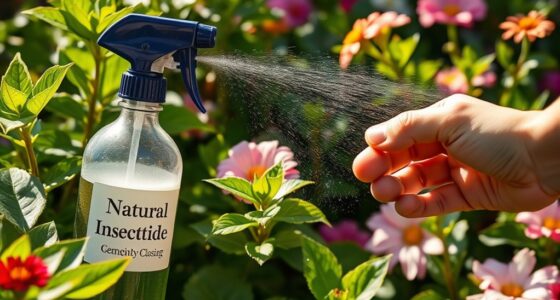To create a DIY natural insecticide using soap sprays, mix pure biodegradable soap with water in a spray bottle, adding a few drops of neem oil or essential oils for extra pest control. Apply the solution directly to garden pests like aphids and mites, covering both sides of leaves. Use regularly, especially early morning or evening, to keep pests at bay. Keep exploring for more tips to perfect your homemade pest management approach.
Key Takeaways
- Homemade soap sprays effectively control soft-bodied pests while being safe for beneficial insects and eco-friendly.
- Use biodegradable or organic liquid soap mixed with water, avoiding harsh additives for safe application.
- Spray thoroughly on both sides of plant leaves, applying early morning or evening to protect beneficial insects.
- Enhance the spray’s effectiveness by adding neem oil or essential oils like peppermint or eucalyptus.
- Reapply every few days or after rain, focusing on affected areas for optimal pest management.

Are you tired of using chemical insecticides that harm your garden and the environment? If so, switching to homemade soap sprays can be a game-changer. Not only are they effective at controlling pests, but they also serve as safe chemical alternatives that won’t wipe out beneficial insects like ladybugs, lacewings, or bees. These beneficial insects play a critical role in keeping your garden healthy by naturally managing pest populations. Using chemical pesticides often disrupts this delicate balance, killing both pests and helpful pollinators. In contrast, soap sprays target pests directly without harming these valuable allies, making your garden more resilient and eco-friendly.
Making your own soap spray is simple and affordable. You only need a few ingredients: pure liquid soap (preferably biodegradable or organic), water, and sometimes a little oil or insecticidal soap concentrate. The key is choosing a gentle soap that doesn’t contain harsh additives or degreasers, which can damage plant leaves or harm beneficial insects. Once you mix the soap with water, you’ve got a powerful, natural insecticide ready to spray on affected plants. It works by suffocating soft-bodied pests like aphids, spider mites, and whiteflies, disrupting their cell membranes and causing dehydration. Since it’s a contact pesticide, it’s most effective when applied directly to pests and their hiding spots.
One of the biggest advantages of soap sprays is their safety. You can confidently use them around children, pets, and beneficial insects without worrying about toxic residues. Plus, they’re biodegradable and don’t pollute your soil or water systems. Regular application of soap sprays can help keep pest populations in check without the need for harmful chemical alternatives. Remember, though, that consistency is key — spray early in the morning or evening when beneficial insects are less active, and target only affected areas to minimize any impact on non-pest insects.
Another benefit of soap sprays is their versatility. You can customize your solution based on your garden’s needs. For instance, adding a few drops of neem oil or essential oils like peppermint or eucalyptus can enhance pest-repelling properties. Always test your spray on a small part of the plant first to check for any adverse reactions. When applying, be thorough, covering both the top and underside of leaves, where pests often hide. Reapply every few days or after rain to maintain its effectiveness.
Frequently Asked Questions
How Long Does a Soap Spray Solution Last Before Needing Replacement?
Your soap spray solution typically stays effective for about one to two weeks, depending on storage conditions. To maximize solution stability, store it in a cool, dark place, and keep it in an airtight container. Always check for signs of separation or mold before use. When in doubt, it’s best to prepare fresh solution to guarantee maximum effectiveness and avoid potential damage to your plants.
Can Soap Sprays Harm Beneficial Garden Insects?
You might hesitate, wondering if soap sprays harm beneficial insects. The truth is, soap spray selectivity plays a vital role. When used properly, these sprays target pests without risking beneficial insect safety. But, over-application or harsh solutions can inadvertently affect helpful bugs like bees and ladybugs. So, always follow instructions carefully. Your garden’s balance depends on understanding how soap sprays interact with all your insects—protect the good ones while controlling the pests.
What Plants Are Most Sensitive to Soap Sprays?
You should know that some plants are more sensitive to soap sprays, especially those with tender leaves or new growth. These plants can react negatively to soap residue, leading to leaf curling, yellowing, or damage. It’s best to test a small area first and avoid applying soap spray directly on delicate plants like ferns, impatiens, or certain herbs. Monitoring plant responses helps prevent unintended harm caused by soap residue and plant sensitivity.
Are There Any Safety Precautions When Applying Soap Sprays?
When applying soap sprays, you should take safety precautions seriously. Always wear protective gear like gloves and goggles to prevent skin and eye irritation. Also, pay attention to application timing; spray early in the morning or late in the evening to avoid harming beneficial insects and to guarantee the solution adheres better. These steps help keep you safe and maximize the effectiveness of your natural insecticide.
How Often Should Soap Sprays Be Reapplied for Effective Pest Control?
Imagine your garden thriving, yet pests keep trying to resist your efforts—this is where reapplication comes in. You should reapply soap sprays every 7 to 10 days, especially after rain, to prevent pest resistance from developing. Consistent use minimizes environmental impact and keeps pests at bay without overdoing it. Regular reapplication guarantees your plants stay healthy and protected, maintaining an effective, eco-friendly pest control routine.
Conclusion
Now that you’ve learned how simple it is to whip up your own soap spray, it’s funny how nature often provides the best solutions right at your fingertips. Just as a gentle spray can keep pests away, it’s also a reminder that small, mindful actions can make a big difference. So, next time you’re tending your garden, remember—sometimes, the best answers are right there in your kitchen, waiting to surprise you. Happy gardening!









